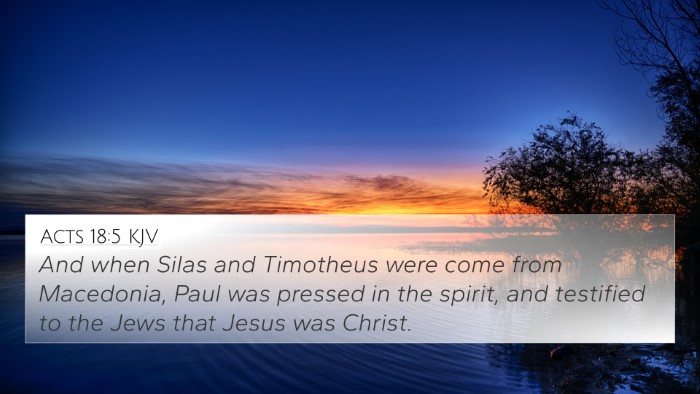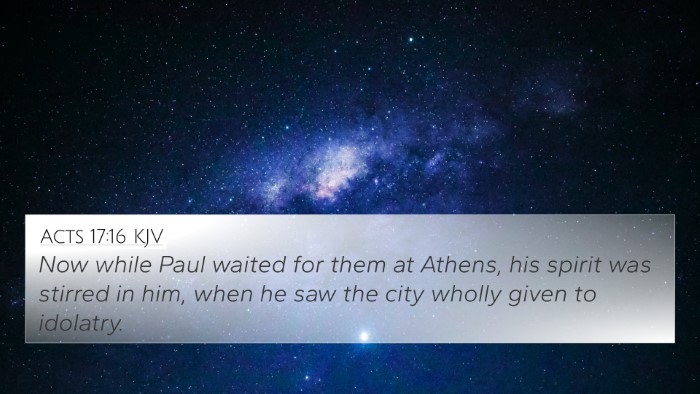Understanding Acts 17:15
This commentary focuses on Acts 17:15, which states:
“And they that conducted Paul brought him unto Athens: and receiving a commandment unto Silas and Timotheus for to come to him with all speed, they departed.”
Summary of Acts 17:15
Acts 17:15 narrates the events following Paul’s ministry in Thessalonica, highlighting the role of his companions in ensuring his safety by escorting him to Athens. This moment signifies a pivotal transition in Paul’s missionary journey.
Insights from Commentaries
-
Matthew Henry:
Henry emphasizes the protective role of Paul's companions, Silas and Timothy, who are seen as vital to the continuity of his mission. Their swift response illustrates the importance of community support in the face of adversity.
-
Albert Barnes:
Barnes points out the urgency of the situation; the command for Silas and Timothy to join Paul signifies the importance of collaboration in the ministry. It reflects the shared responsibility in spreading the gospel and responding to challenges.
-
Adam Clarke:
Clarke notes the geographical significance of Athens as a cultural hub, indicating that Paul's mission there was not simply about survival but also about engaging a society steeped in philosophy and diverse beliefs.
Connecting Bible Verses
Acts 17:15 can be cross-referenced with several verses that offer deeper insights and thematic connections:
-
Acts 16:1-3 - Highlights Paul’s previous interactions with Timothy, showcasing their established relationship and Timothy’s importance in Paul’s ministry.
-
Philippians 2:19-20 - Paul expresses his reliance on Timothy, further reinforcing their bond and the necessity of faithful companions in ministry.
-
Romans 16:21 - Mentions Timothy as a co-worker, illustrating the collaborative nature of ministry in the early church.
-
1 Thessalonians 3:1-2 - Reflects on sending Timothy to strengthen and encourage believers, paralleling the intent behind the actions in Acts 17:15.
-
Acts 17:16 - Directly follows Acts 17:15, detailing Paul’s arrival in Athens and his immediate concerns about the city’s idolatry, which sets the stage for his teaching.
-
Acts 15:40-41 - Discusses the split between Paul and Barnabas and Paul's commitment to further missionary efforts, which contextualizes his journey to Athens.
-
2 Corinthians 1:24 - Emphasizes the role of fellow believers in the faith journey, reinforcing the necessity of collaboration found in Acts 17:15.
Thematic Connections
This verse illustrates the overarching themes present in the New Testament:
-
Community Support: Just as Paul was supported by his companions, believers are encouraged to uphold one another in faith and mission.
-
Missionary Urgency: The quick dispatching of Timothy and Silas signifies the pressing nature of the Gospel mission, relevant for contemporary evangelism.
-
The Influence of Culture: Paul’s destination—Athens—serves as a reminder of the need to engage with diverse cultures and philosophies as part of the Christian mission.
Learning from Acts 17:15
Studying Acts 17:15 provides a lens through which to view the early church's values of cooperation, urgency in ministry, and cultural engagement. The connections between this verse and others deepen our understanding of the interdependence within the body of Christ and the transformative power of the Gospel across diverse contexts.
Tools for Bible Cross-Referencing
For those interested in exploring these connections further, various tools are available:
- Bible concordances
- Bible cross-reference guides
- Software for cross-referencing Bible study
- Comprehensive Bible cross-reference materials
Conclusion
Acts 17:15 serves as a pivotal moment in Paul's journey, emphasizing the collaborative nature of ministry, the urgency of spreading the Gospel, and engaging meaningfully with different cultures. By utilizing cross-referencing techniques, readers can uncover rich connections between scripture, providing deeper insights into the overarching narrative of the Bible. Engaging with these themes reinforces the essential role of companionship in faith and the proactive nature required for effective ministry.











